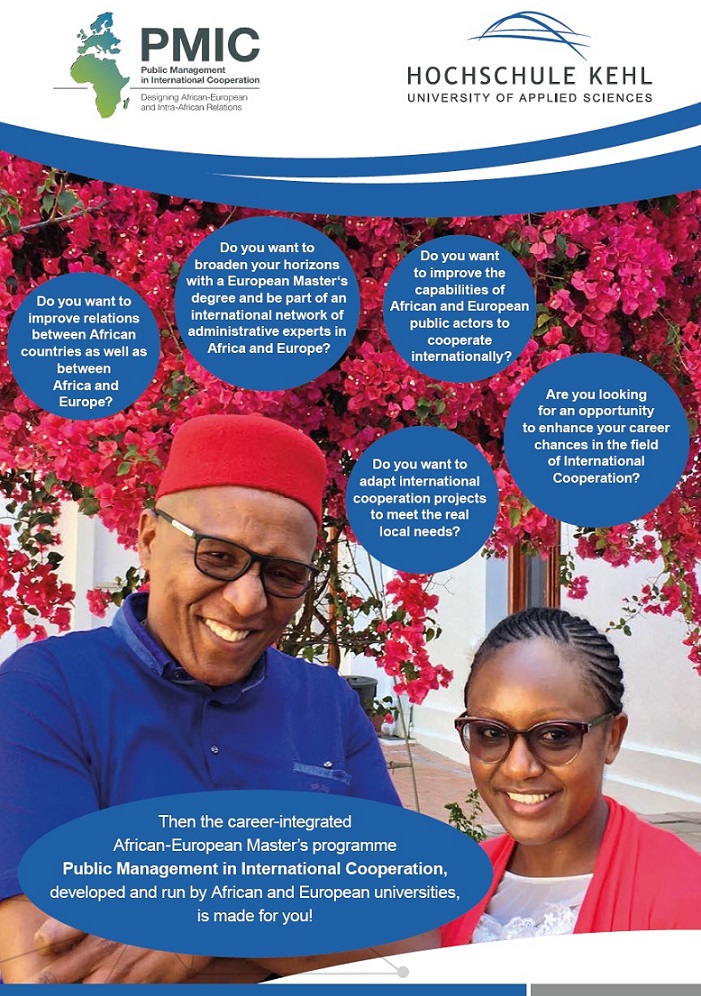Act locally, think globally
Improve international cooperation projects in the context of public administration with the Master's degree programme "Public Management in International Cooperation".
career-integrated
During the distance learning phases, you will work in small, internationally mixed groups on tasks to prepare for and follow up on during the four attendance phases in Europe and Africa.
cooperative
Learn how administrative staff from different countries work together across continents and successfully manage international projects.
cross-cultural
African and European students learn together across continental borders in face-to-face and distance learning phases - thus realistically simulating the realisation of international projects.
At a glance
Academic degree
Type of degree
Application period
Start of studies
Study fees
Available study places
Language
Master of Arts (M.A.)
career-integrated, 4 semesters, 90 ECTS
8 January to 11 March 2024
annually 1 September
EUR 4,500 plus travel and accommodation expenses | scholarships are available
28 per year
English, partly with French-language options
African partners
The partner universities of the Master's programme are
- Ethiopian Civil Service University (ECSU), Addis Ababa, Ethiopia
- School of Public Leadership, Stellenbosch University (SU), South Africa
- Centre Africain d’Etudes Supérieures au Gestion (CESAG), Dakar, Senegal
- Institut de la Gouvernance Territoriale (IGT) of Université Cheikh Anta Diop Dakar (UCAD), Dakar, Senegal
Study contents
Public Policies
Sustainable Development | Core Public Policy Fields like Social Security, Public Health, Education, Infrastructure etc.
Public Management
Management and Leadership | Organisational Management | Human Resource Management | IT and eGovernment
Governance
Constitutional Law Theory | Economic Systems | Political and societal Systems
Intercultural Competence
Interculturality | Conflict Transformation | Cooperation Strategies | Managing Diversity
Finances
Regional Competitiveness | Financial Management and Strategy | Financial Controlling | Risk Management
Development Cooperation
Global Challenges | Geopolitics | History
Course of study
The two-year Master's programme simulates work in an IC project. Students from West, East and South Africa as well as from Europe meet in four face-to-face phases at different locations in Europe and Africa. In the intervening distance learning phases, they work in small, internationally mixed groups on tasks that are set for them in the face-to-face phases.
Two weeks in September/October
Two weeks in January
Two weeks in May/June
Two weeks in November/December
Objectives of the Master's programme
TARGET GROUP
The programme is aimed at practitioners from African and European countries with at least two years of relevant professional experience who wish to improve international cooperation in the context of public administration.
EDUCATIONAL GOAL
The aim is to impart skills, knowledge and competences that will enable students to assume responsibility in professional fields of international cooperation independently, systematically and with scientific methodology.
POSSIBLE FIELDS OF WORK
Management and leadership positions within international cooperation, e.g. in
- State administrations at all levels
- NGO administrations
- organisations of the United Nations, the African Union or the European Union, etc.
Application
Please note: Due to a system change, applications and enrolments will not be possible between 3 June and 16 June 2024.

- University degree with at least 180 ECTS credits or six semesters (preferred subjects: administrative, legal, social, political or economic sciences)
- at least two years of professional experience in international cooperation, public administration or in connection with one of the above-mentioned areas
- good command of English (at least level B2 of the Common European Framework of Reference for Languages)
The course is aimed at full-time and part-time administrative staff of governmental and non-governmental (NGO) institutions and organisations in Germany, African countries and other countries of the Global North and South, especially if they already have or aspire to a role in international cooperation of all kinds.
In particular, people who are already working in international cooperation administrations, as political partners or in the implementation of international cooperation projects are eligible. The programme is not limited to the countries of the partner universities but is open to all interested parties, especially from African and European countries.
To apply please register via the Online application platform. Please upload the following documents:
- Proof of university degree
- Can be proven by a university certificate and a transcript of records.
- Recognition if a degree program was studied outside the ECTS system is based on the ERASMUS tables.
- IMPORTANT: You must have your foreign degree certificate recognised by the Studienkolleg Kontanz. This can take up to 6 weeks. You can find more information on this in the Guide.
- Proof of two years of relevant professional experience
- Proof of English language proficiency level B2 by means of a certificate such as TOEFL or Cambridge Certificate. If your university degree is based on an English-language study programme, please submit proof of this from your university. In this case, you do not need a language certificate.
- Accompanying letter from your employer confirming your agreement and release from work for the attendance phases and, if applicable, financial support from your employer.
- Curriculum vitae
- Letter of motivation in English including the following questions: "Why do I want to apply to this study program?" & "Why is the program important in the overall perspective?"
